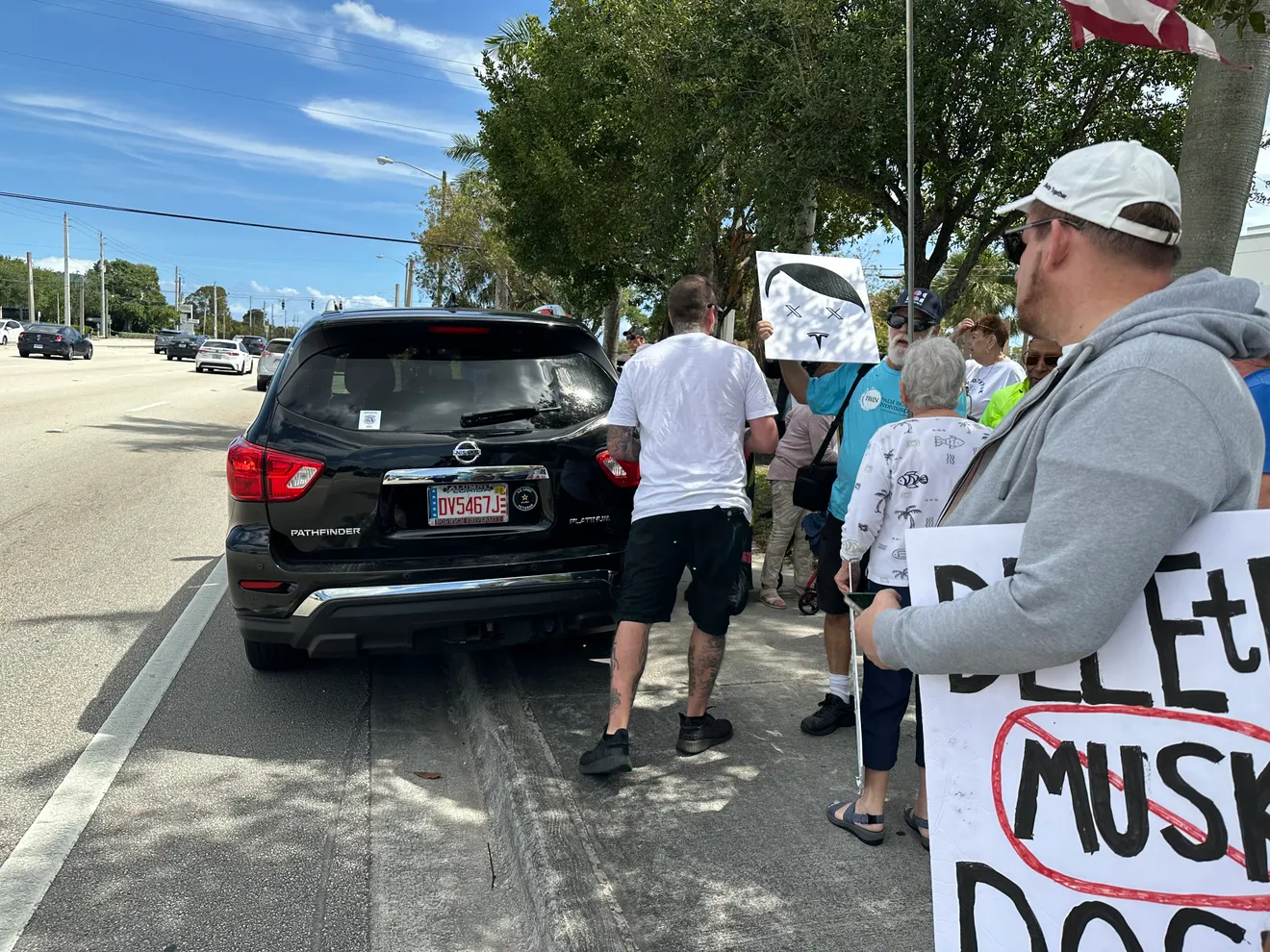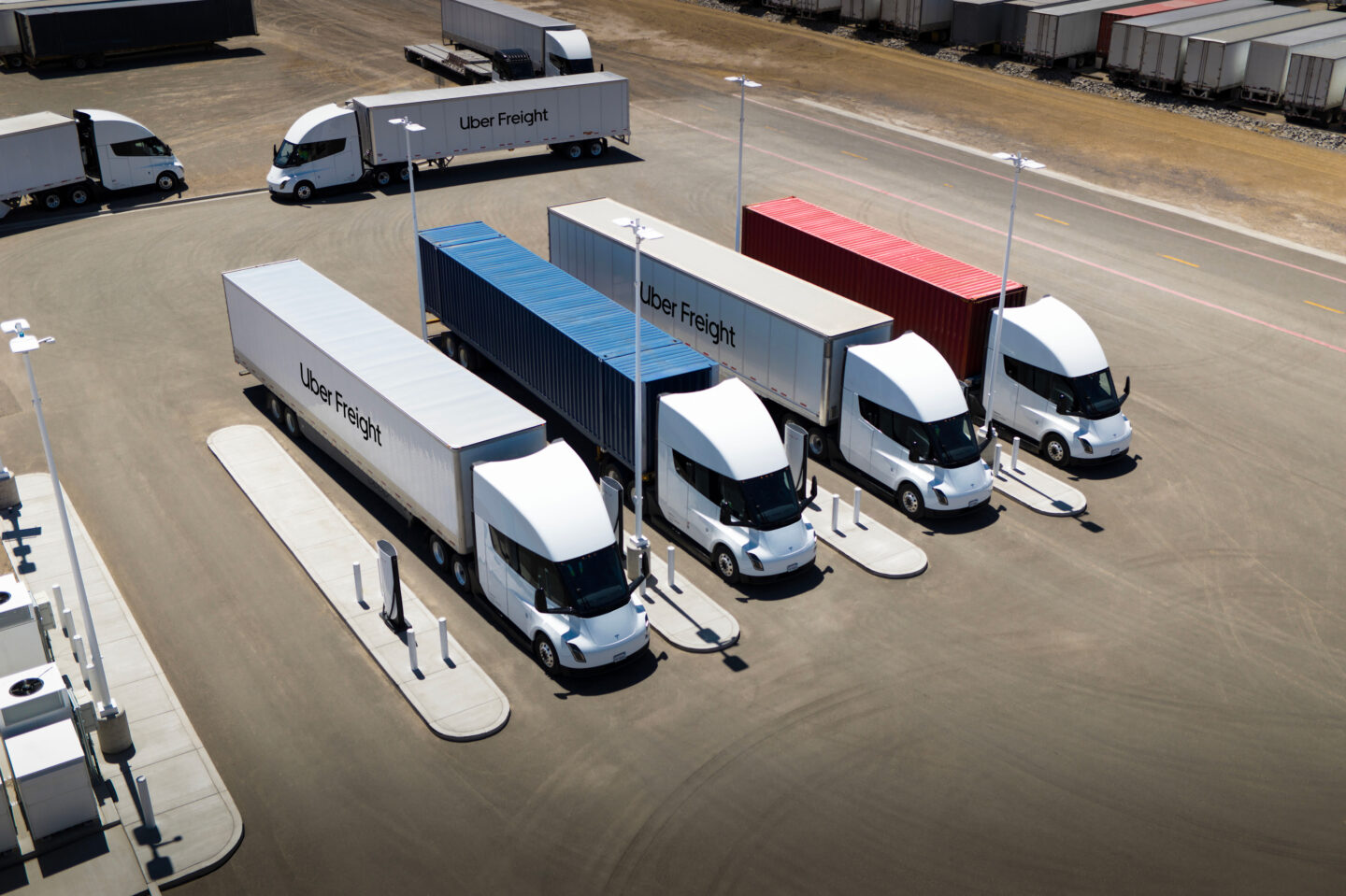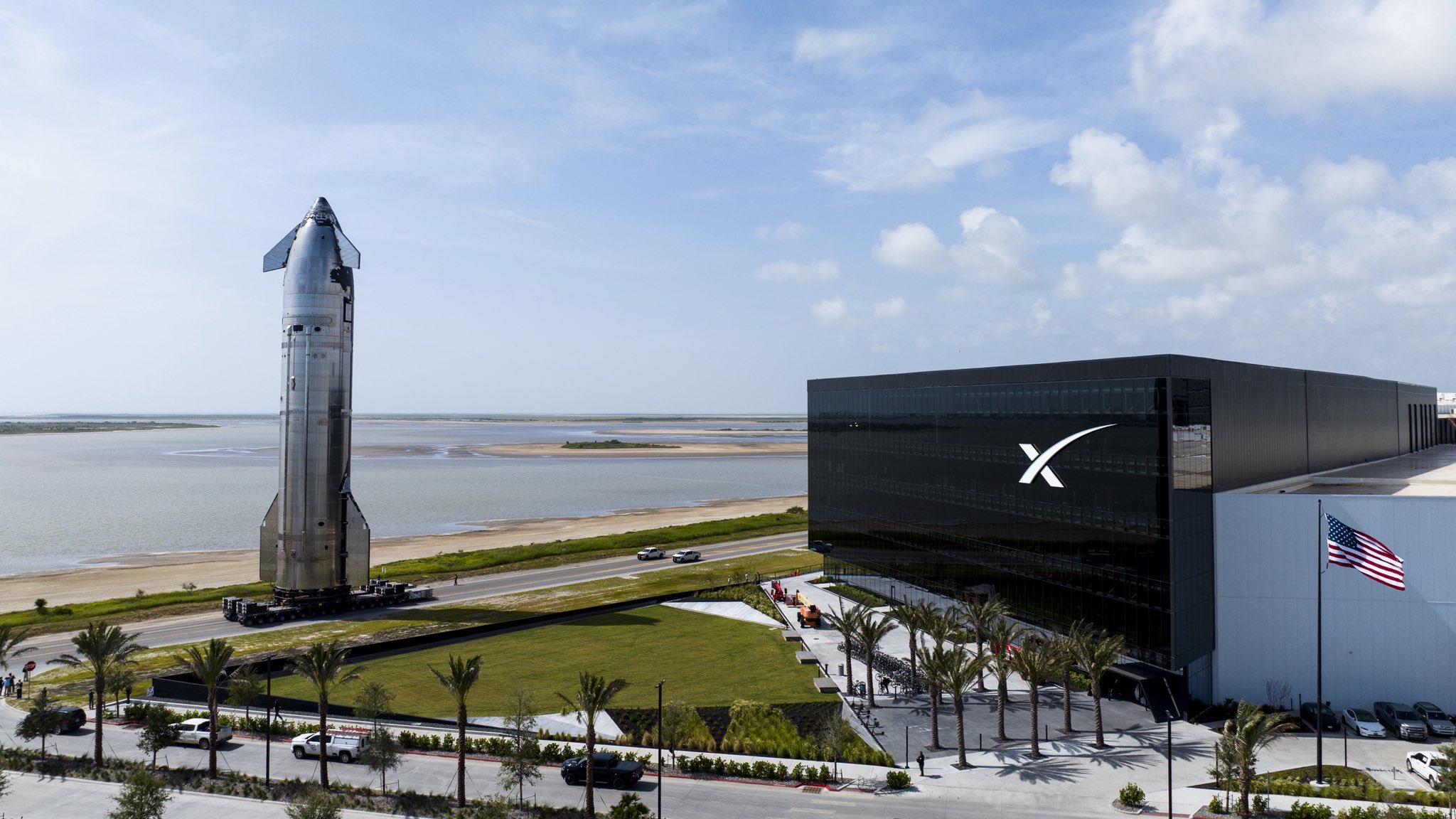News
Florida man charged after trying to hit Tesla protestors with car
Tesla protestors were nearly struck with the man’s car, though authorities say no one was injured.

A man in Florida has been charged with assault after attempting to drive into protestors outside of a Tesla store over the weekend, coming as the latest in ongoing protests and vandalism against CEO Elon Musk.
On Saturday, 44-year-old Andrew Tutil attempted to drive into protestors with his Nissan Pathfinder at the West Palm Beach Tesla store, although no one was injured, according to a report from Palm Beach Daily News. The store had around 150 protestors outside around 1:00 p.m., and Tutil reportedly drove slowly into the crowd before parking on the sidewalk and getting out.
“He drove into a crowd of senior citizens,” said Mark Offerman. “Everybody was able to move out, but two older women were really almost clipped. We immediately called the cops.”
After parking on the sidewalk where protestors had to jump out of the way, Tutil, a retired U.S. Army Captain, civil engineer, and supporter of Donald Trump, claimed that he was an employee of the Tesla store and that his brakes and electronics had malfunctioned, according to Offerman.
Palm Beach County records show that Tutil was later arrested and charged with first-degree felony aggravated assault with a deadly weapon without intent after police questioned Tutil and surrounding witnesses and reviewed photos and video footage.
The news comes as a wave of protests, acts of vandalism, and some violent encounters such as this one have been increasingly targeting Tesla stores in recent weeks against Musk and the Trump administration. Additionally, Musk’s work with Trump’s newly created “government efficiency” division has been a central theme in protests at Tesla stores, as federal workers have expressed criticism for the administration’s approach to “eliminating fraud and waste.”
🚨 President Trump on Tesla protests and vandalism:
— TESLARATI (@Teslarati) March 11, 2025
READ MORE ON TESLA PROTESTS: I went to an anti-Musk protest at a Tesla store in Colorado—here’s what I experienced
The widespread protests began in January, after Musk performed what many said looked like a Nazi salute at Trump’s inauguration ceremony, and after he spoke at a campaign event for the far-right German party Alternative for Germany (AfD). During the rally, Musk said that there was “too much of a focus on past guilt and we need to move beyond that,” which many claimed was in reference to Nazi Germany.
The so-called “Tesla Takedown” movement launched over the past several weeks is targeting around 500 separate protests across 277 stores around the U.S. The Palm Beach protest on Saturday was just one of a handful in Florida alone, including those in Gainesville, Jacksonville, Merrit Island, and Sarasota, to name a few.
One protestor at a Tesla store in Colorado earlier this month told Teslarati that she was protesting Musk because she was “highly concerned that our Constitution is being ignored,” adding that “it’s dangerous to have power rest in a handful of ultra-wealthy people.”
Others at the event highlighted Musk and Trump’s attacks on queer, trans, and non-binary people, as well as the administration’s recent controversies with Ukraine President Volodymyr Zelenskyy, and claims that the President is aligning with Russia President Vladimir Putin, as a few of the major reasons they were protesting at the Loveland Tesla store.
Musk has mostly deflected and made light of claims of his alignment with Nazis, while the public has been polarized on defending or condemning these and other actions.
The Tesla CEO was defended by Israel Prime Minister Benjamin Netanyahu, who said he was being “falsely smeared” immediately following the inauguration event. While the Anti-Defamation League (ADL) also went on to defend the action as an “awkward gesture,” the group has since condemned some of Musk’s more recent posts making light of genocide.
Earlier this month, Musk reposted then deleted a screenshot shared by X user Rothmus claiming that “Stalin, Mao and Hitler didn’t murder millions of people,” but that “their public sector workers did.”
“It is deeply disturbing and irresponsible for someone with a large public platform to elevate the kind of rhetoric that serves to undermine the seriousness of these issues,” the ADL wrote in a response on X.

Credit: Rothmus/Alice Smith (via Elon Musk repost on X)
In addition to what have largely appeared to be peaceful protests at Tesla stores, a number of acts of vandalism, including graffiti, arson, and some even more violent assaults involving weapons, have been targeting the automaker’s locations around the world.
Multiple people were taken into custody following repeated arson and graffiti at a Tesla store in Colorado within the past few weeks, while multiple Tesla vehicles have been set on fire at stores, and one Tesla store has been shot at. Owners of Tesla’s vehicles have also been targeted in public, with some being captured on Sentry Mode keying or tagging the vehicles.
The Trump administration has also started labeling such attacks against Tesla as “domestic terrorism,” and the Federal Bureau of Investigation (FBI) has started investigating several of the events, including one involving two Cybertrucks that were set on fire in Seattle and another at a store in Oregon that was shot at twice in a few weeks.
Tesla’s Giga Berlin director responds to anti-Musk criticism

News
Tesla adds a new feature to Navigation in preparation for a new vehicle
After CEO Elon Musk announced earlier this week that the Semi’s mass production processes were scheduled for later this year, the company has been making various preparations as it nears manufacturing.

Tesla has added a new feature to its Navigation and Supercharger Map in preparation for a new vehicle to hit the road: the Semi.
After CEO Elon Musk announced earlier this week that the Semi’s mass production processes were scheduled for later this year, the company has been making various preparations as it nears manufacturing.
Elon Musk confirms Tesla Semi will enter high-volume production this year
One of those changes has been the newly-released information regarding trim levels, as well as reports that Tesla has started to reach out to customers regarding pricing information for those trims.
Now, Tesla has made an additional bit of information available to the public in the form of locations of Megachargers, the infrastructure that will be responsible for charging the Semi and other all-electric Class 8 vehicles that hit the road.
Tesla made the announcement on the social media platform X:
We put Semi Megachargers on the map
→ https://t.co/Jb6p7OPXMi pic.twitter.com/stwYwtDVSB
— Tesla Semi (@tesla_semi) February 10, 2026
Although it is a minor development, it is a major indication that Tesla is preparing for the Semi to head toward mass production, something the company has been hinting at for several years.
Nevertheless, this, along with the other information that was released this week, points toward a significant stride in Tesla’s progress in the Semi project.
Now that the company has also worked toward completion of the dedicated manufacturing plant in Sparks, Nevada, there are more signs than ever that the vehicle is finally ready to be built and delivered to customers outside of the pilot program that has been in operation for several years.
For now, the Megachargers are going to be situated on the West Coast, with a heavy emphasis on routes like I-5 and I-10. This strategy prioritizes major highways and logistics hubs where freight traffic is heaviest, ensuring coverage for both cross-country and regional hauls.
California and Texas are slated to have the most initially, with 17 and 19 sites, respectively. As the program continues to grow, Florida, Georgia, Illinois, Washington, New York, and Nevada will have Megacharger locations as well.
For now, the Megachargers are available in Lathrop, California, and Sparks, Nevada, both of which have ties to Tesla. The former is the location of the Megafactory, and Sparks is where both the Tesla Gigafactory and Semifactory are located.
Elon Musk
Tesla stock gets latest synopsis from Jim Cramer: ‘It’s actually a robotics company’
“Turns out it’s actually a robotics and Cybercab company, and I want to buy, buy, buy. Yes, Tesla’s the paper that turned into scissors in one session,” Cramer said.

Tesla stock (NASDAQ: TSLA) got its latest synopsis from Wall Street analyst Jim Cramer, who finally realized something that many fans of the company have known all along: it’s not a car company. Instead, it’s a robotics company.
In a recent note that was released after Tesla reported Earnings in late January, Cramer seemed to recognize that the underwhelming financials and overall performance of the automotive division were not representative of the current state of affairs.
Instead, we’re seeing a company transition itself away from its early identity, essentially evolving like a caterpillar into a butterfly.
The narrative of the Earnings Call was simple: We’re not a car company, at least not from a birds-eye view. We’re an AI and Robotics company, and we are transitioning to this quicker than most people realize.
Tesla stock gets another analysis from Jim Cramer, and investors will like it
Tesla’s Q4 Earnings Call featured plenty of analysis from CEO Elon Musk and others, and some of the more minor details of the call were even indicative of a company that is moving toward AI instead of its cars. For example, the Model S and Model X will be no more after Q2, as Musk said that they serve relatively no purpose for the future.
Instead, Tesla is shifting its focus to the vehicles catered for autonomy and its Robotaxi and self-driving efforts.
Cramer recognizes this:
“…we got results from Tesla, which actually beat numbers, but nobody cares about the numbers here, as electric vehicles are the past. And according to CEO Elon Musk, the future of this company comes down to Cybercabs and humanoid robots. Stock fell more than 3% the next day. That may be because their capital expenditures budget was higher than expected, or maybe people wanted more details from the new businesses. At this point, I think Musk acolytes might be more excited about SpaceX, which is planning to come public later this year.”
He continued, highlighting the company’s true transition away from vehicles to its Cybercab, Optimus, and AI ambitions:
“I know it’s hard to believe how quickly this market can change its attitude. Last night, I heard a disastrous car company speak. Turns out it’s actually a robotics and Cybercab company, and I want to buy, buy, buy. Yes, Tesla’s the paper that turned into scissors in one session. I didn’t like it as a car company. Boy, I love it as a Cybercab and humanoid robot juggernaut. Call me a buyer and give me five robots while I’m at it.”
Cramer’s narrative seems to fit that of the most bullish Tesla investors. Anyone who is labeled a “permabull” has been echoing a similar sentiment over the past several years: Tesla is not a car company any longer.
Instead, the true focus is on the future and the potential that AI and Robotics bring to the company. It is truly difficult to put Tesla shares in the same group as companies like Ford, General Motors, and others.
Tesla shares are down less than half a percent at the time of publishing, trading at $423.69.
Elon Musk
SpaceX secures win as US labor board drops oversight case
The NLRB confirmed that it no longer has jurisdiction over SpaceX.

SpaceX scored a legal victory after the National Labor Relations Board (NLRB) decided to dismiss a case which accused the company of terminating engineers who were involved in an open letter against founder Elon Musk.
The NLRB confirmed that it no longer has jurisdiction over SpaceX. The update was initially shared by Bloomberg News, which cited a letter about the matter it reportedly reviewed.
In a letter to the former employees’ lawyers, the labor board stated that the affected employees were under the jurisdiction of the National Mediation Board (NMB), not the NLRB. As a result, the labor board stated that it was dismissing the case.
As per Danielle Pierce, a regional director of the agency, “the National Labor Relations Board lacks jurisdiction over the Employer and, therefore, I am dismissing your charge.”
The NMB typically oversees airlines and railroads. The NLRB, on the other hand, covers most private-sector employers, as well as manufacturers such as Boeing.
The former SpaceX engineers have argued that the private space company did not belong under the NMB’s jurisdiction because SpaceX only offers services to “hand-picked customers.”
In an opinion, however, the NMB stated that SpaceX was under its jurisdiction because “space transport includes air travel” to get to outer space. The mediation board also noted that anyone can contact SpaceX to secure its services.
SpaceX had previously challenged the NLRB’s authority in court, arguing that the agency’s structure was unconstitutional. Jennifer Abruzzo, the NLRB general counsel under former United States President Joe Biden, rejected SpaceX’s claims. Following Abruzzo’s termination under the Trump administration, however, SpaceX asked the labor board to reconsider its arguments.
SpaceX is not the only company that has challenged the constitutionality of the NLRB. Since SpaceX filed its legal challenge against the agency in 2024, other high-profile companies have followed suit. These include Amazon, which has filed similar cases that are now pending.








